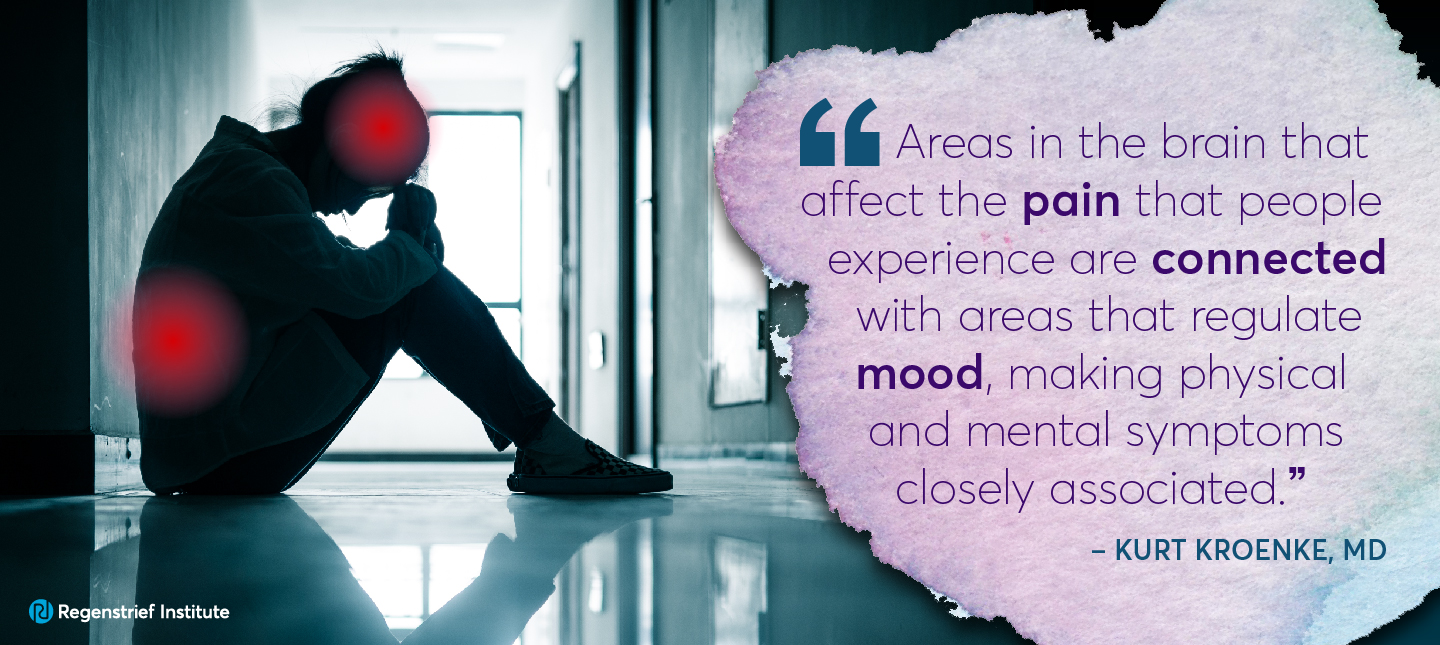JAMA Network Open commentary focuses on the relationship of pain, depression and anxiety
Chronic pain is often accompanied by depression and anxiety. In an invited commentary published in JAMA Network Open, Kurt Kroenke, M.D., of Regenstrief Institute and Indiana University School of Medicine discusses the relationship between pain, the most common symptom for which individuals visit a physician, and depression and anxiety, the two most prevalent mental health conditions worldwide. He highlights the importance of not neglecting psychological symptoms in patients experiencing pain.
“One of the reasons for the bi-directional linkage between pain and depression, as well as anxiety, is the existence of a feedback loop. Individuals with pain don’t sleep well and their resulting tiredness affects their mood, making them vulnerable to depression and anxiety. Having problems with depression or anxiety can increase susceptibility to pain.
“Also, areas in the brain that affect the pain that people experience are connected with areas that regulate mood, making physical and mental symptoms closely associated,” Dr. Kroenke said.
Noting that successfully addressing depression and anxiety is associated with improvement in pain, he observes that treating pain may not improve depression and anxiety to the same degree but does not negate the benefit of identifying and treating both physical and psychological symptoms.
“Symptoms of the body and the mind are frequent fellow travelers,” said Dr. Kroenke. “But patients seeing their primary care physician for a headache, back or muscle or leg pain or stomachache often neglect to mention the symptoms commonly associated with depression and anxiety that they are also experiencing such as fatigue, lack of motivation, nervousness and moodiness. And physicians don’t always ask about symptoms beyond the ones which brought the patient into the office.
“Un- or under-treated, these emotional symptoms can cause long-term suffering and impaired quality of life. If clinicians measure and monitor both physical and mental symptoms they will be more able and likely to treat them. But there is no blood pressure cuff, lab test or X-ray for symptoms. We don’t have a way to measure symptoms other than from what the patient tells us, yet screening and diagnosis are crucial to improving patient outcomes.”
Dr. Kroenke is one of the fathers and leaders of the growing field of symptomology and the developer of several validated and widely used scales which enable clinicians to use feedback from patients to measure type and severity of pain (PEG), depression (PHQ-9), anxiety (GAD-7) and other symptoms including cancer fatigue (FSI-3) and risk of suicide (P-4). These brief measurement tools have been translated into more than 100 languages.
Symptoms account for half of all outpatient primary care visits. In a review article published in 2014, Dr. Kroenke and colleagues reported that one in three common symptoms do not have a clear-cut disease-based explanation. That percentage is now thought to be more than one in two, he says.
The need to address both physical and psychological symptoms has long been recognized, says Dr. Kroenke, whose measurement tools are helping physicians to do so. He concludes his JAMA Network Open commentary with an illustrative quote from Ovid [born 43 B.C.], “I am no better in mind than in body; both alike are sick and I suffer double hurt.”
“Improvements in Pain or Physical Function and Changes in Depression and Anxiety Symptoms” is published in JAMA Network Open.
About Kurt Kroenke, M.D.
In addition to his role as a research scientist with the William M. Tierney Center for Health Services Research at Regenstrief Institute, Dr. Kroenke, is also an IUPUI Chancellor’s professor and a professor of medicine at Indiana University School of Medicine.
About Regenstrief Institute
Founded in 1969 in Indianapolis, the Regenstrief Institute is a local, national and global leader dedicated to a world where better information empowers people to end disease and realize true health. A key research partner to Indiana University, Regenstrief and its research scientists are responsible for a growing number of major healthcare innovations and studies. Examples range from the development of global health information technology standards that enable the use and interoperability of electronic health records to improving patient-physician communications, to creating models of care that inform clinical practice and improve the lives of patients around the globe.
Sam Regenstrief, a nationally successful entrepreneur from Connersville, Indiana, founded the institute with the goal of making healthcare more efficient and accessible for everyone. His vision continues to guide the institute’s research mission.
About IU School of Medicine
IU School of Medicine is the largest medical school in the U.S. and is annually ranked among the top medical schools in the nation by U.S. News & World Report. The school offers high-quality medical education, access to leading medical research and rich campus life in nine Indiana cities, including rural and urban locations consistently recognized for livability.










